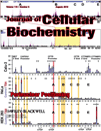
Cell Stress
Scope & Guideline
Unlocking the Secrets of Cell Stress Mechanisms
Introduction
Aims and Scopes
- Cellular Stress Mechanisms:
This area encompasses studies on how cells respond to various stressors, including oxidative stress, nutrient deprivation, and mechanical stress, exploring pathways like autophagy and apoptosis. - Cancer Biology and Therapy:
The journal focuses on the role of stress responses in cancer development, progression, and treatment, including the investigation of novel therapeutic targets and strategies to overcome cancer resistance. - Microbiota and Health:
Research on the interaction between microbiota and host health, particularly in relation to metabolic diseases and cancer, highlighting the impact of gut health on overall well-being. - Neurological Disorders:
Exploration of the cellular stress responses in neurodegenerative diseases, including Alzheimer's and Huntington's, with an emphasis on autophagy and mitochondrial function. - Immunology and Inflammation:
Studies that examine the role of cellular stress in immune responses, inflammation, and the implications for disease and therapy, particularly in cancer and autoimmune diseases. - Metabolism and Aging:
Research on how cellular stress impacts metabolic pathways and aging processes, investigating potential interventions to promote healthspan and lifespan.
Trending and Emerging
- Liquid-Liquid Phase Separation in Cellular Processes:
An increasing number of studies are investigating the role of phase separation in cellular functions, particularly in relation to cancer biology and stress responses. - Psychosocial Factors in Health:
Research exploring the psychosocial aspects of health and disease, particularly how stress affects psychosocial adaptation, is gaining attention, indicating a holistic approach to health. - Microbiota's Role in Disease Modulation:
Emerging themes focus on the gut microbiota's influence on various diseases, particularly in cancer therapy and metabolic disorders, showcasing the interplay between microbiota and host health. - Senolytics and Aging Research:
There is a growing interest in senolytic compounds and their potential to target aging cells, reflecting an increasing focus on longevity and healthspan. - Immunotherapy Advances in Oncology:
The journal is increasingly publishing on innovative immunotherapeutic strategies, particularly those that enhance T cell function against tumors, indicating a shift towards personalized cancer therapies.
Declining or Waning
- Traditional Cancer Therapies:
There is a noticeable reduction in studies focusing on conventional cancer treatment modalities, like chemotherapy, as newer, more targeted therapies gain traction. - Basic Mechanistic Studies:
Research that solely explores basic mechanisms of cellular stress without translational applications is becoming less frequent, indicating a shift towards studies with direct clinical relevance. - In Vivo Studies of Non-Cancerous Conditions:
The emphasis on in vivo studies related to non-cancerous conditions has decreased, possibly because of a growing focus on cancer and its treatments.
Similar Journals

CELL CYCLE
Exploring the Dynamics of Cell Proliferation.CELL CYCLE, an esteemed journal published by Taylor & Francis Inc., stands at the forefront of biological research, focusing on the intricate mechanisms of cell proliferation, molecular biology, and developmental biology. With an ISSN of 1538-4101 and an E-ISSN of 1551-4005, this journal has established its influence in the field with a commendable impact factor reflecting its rigorous peer-review process and high-quality publications. Notably, in 2023, it achieved a Q1 ranking in Medicine (miscellaneous) and a Q2 ranking in both Cell Biology and Developmental Biology, marking its vital role in advancing scientific understanding and innovation. Operating within a converged framework from 2002 to 2024, CELL CYCLE caters to a diverse audience of researchers, professionals, and students eager to explore contemporary findings and emerging trends. The journal's objective is to disseminate groundbreaking research that enhances our understanding of cellular mechanisms, fostering collaboration and innovation. Although not an open-access journal, it remains a premier source for those engaged in cell cycle research, and its contributions have significant implications for fields such as healthcare, biotechnology, and genetics.

BIOCHEMICAL AND BIOPHYSICAL RESEARCH COMMUNICATIONS
Where critical insights meet scientific excellence.BIOCHEMICAL AND BIOPHYSICAL RESEARCH COMMUNICATIONS, published by Academic Press Inc Elsevier Science, stands as a leading periodical in the fields of biochemistry, biophysics, cell biology, and molecular biology. With an ISSN of 0006-291X and an E-ISSN of 1090-2104, this esteemed journal has been a pivotal platform for the dissemination of groundbreaking research since its inception in 1959, continuing to publish influential findings through at least 2024. It holds a commendable Q2 ranking in Biochemistry and Q1 status in Biophysics as of 2023, reflecting its high impact and relevance in the field, supported by its strong Scopus rankings—ranking #43 in Biophysics and maintaining a presence in the top quartiles of several related categories. Although it is not an open-access journal, it provides critical insights and essential data that cater to researchers, professionals, and students keen on advancing their understanding of complex biochemical and biophysical processes. Its significant contributions to the scientific community underscore the importance of this journal as a reference point for innovative research and collaborative discourse.

JOURNAL OF CELLULAR BIOCHEMISTRY
Fostering Excellence in Cellular Biochemistry ResearchJournal of Cellular Biochemistry is a premier academic journal dedicated to advancing the field of biochemistry and cellular biology. Published by Wiley, this influential journal has a significant impact factor that underscores its relevance and authority within the scientific community. With its ISSN 0730-2312 and E-ISSN 1097-4644, the journal has been on the frontier of research since its inception in 1982, and is expected to continue publishing cutting-edge studies through 2024. As evidenced by its ranking in the 2023 Scopus Quartiles, it holds a rank of Q2 in Biochemistry and Q3 in both Cell and Molecular Biology, placing it among the top tiers of scientific journals in these disciplines. The Journal of Cellular Biochemistry serves as a vital resource for researchers, professionals, and students alike, providing a platform for the dissemination of innovative ideas and findings that shape our understanding of cellular processes and biochemical pathways. Though it does not currently offer Open Access options, its robust peer-review process ensures that each publication meets the highest academic standards, thus solidifying its esteemed position in the landscape of biochemical research.

JOURNAL OF PHYSIOLOGY AND BIOCHEMISTRY
Pioneering Research in Physiology and BiochemistryJOURNAL OF PHYSIOLOGY AND BIOCHEMISTRY, published by Springer in the Netherlands, serves as a pivotal platform for disseminating high-quality research within the fields of physiology, biochemistry, and related biomedical sciences. With an impressive impact factor reflected in its categorization as Q2 in Biochemistry and Q1 in Medicine (miscellaneous), this journal fosters a vibrant community of scholars dedicated to advancing knowledge and innovation. The journal’s broad scope encompasses a wide range of topics from cellular mechanisms to systemic physiology, making it relevant for both theoretical and applied sciences. Researchers and practitioners are encouraged to utilize the available Open Access options to reach a wider audience. The journal’s continuous contribution to the scientific dialogue since its inception in 1996 positions it as a key resource for professionals and students alike, facilitating the exploration of cutting-edge topics and collaborative research opportunities.

BIOCHIMICA ET BIOPHYSICA ACTA-MOLECULAR CELL RESEARCH
Advancing the frontiers of cell and molecular biology.BIOCHIMICA ET BIOPHYSICA ACTA-MOLECULAR CELL RESEARCH is a premier journal published by Elsevier, dedicated to advancing the fields of cell biology and molecular biology. Established in 1982, this influential journal has been at the forefront of scientific research and innovation, currently holding esteemed positions with a Q2 ranking in Cell Biology and a Q1 ranking in Molecular Biology for 2023, reflecting its commitment to high-quality scholarship. With an impressive impact factor, it ranks in the 82nd and 78th percentiles for Molecular Biology and Cell Biology, respectively, amongst its peers. Researchers, professionals, and students will find this journal to be an invaluable resource for exploring the latest discoveries and methodologies in the molecular mechanisms underlying cellular functions. Although it is not an open-access journal, the insights offered in its pages contribute significantly to the scientific community's understanding of cellular and molecular processes, ensuring it remains a vital platform for disseminating cutting-edge research.

FEBS LETTERS
Elevating Scientific Discourse in Biological FieldsFEBS LETTERS, published by Wiley, is a prestigious journal that has firmly established its place in the fields of biochemistry, biophysics, genetics, molecular biology, cell biology, and structural biology. With an esteemed history dating back to 1968, this journal continues to be a vital resource for researchers and professionals involved in the biological sciences. It boasts impressive quartile rankings, including Q1 statuses in several categories such as Biochemistry and Genetics, reflecting its high impact factor and significant contribution to scientific discourse. FEBS LETTERS provides a platform for innovative findings and critical reviews, fostering the exchange of knowledge and ideas within the scientific community. Although it operates under a subscription model, the journal ensures broad dissemination of groundbreaking research through its rigorous peer-review process. The vibrant discussions encouraged by articles published in FEBS LETTERS aim to inspire current and future generations of scientists to push the boundaries of biological understanding, making it an indispensable resource for anyone dedicated to advancing their knowledge in these dynamic fields.

Aging-US
Connecting Researchers to the Future of AgingAging-US is a premier peer-reviewed journal dedicated to advancing the field of aging research and cell biology. Published by IMPACT JOURNALS LLC, this journal serves as a vital resource for researchers and professionals exploring the biological mechanisms of aging and their implications for health and disease. With a commendable impact factor reflected in its 2023 Scopus rankings, where it stands at Rank #10/38 in the category of Aging and Rank #63/285 in Cell Biology, Aging-US exemplifies rigorous scientific excellence. Its open access policy enhances accessibility, fostering a wider dissemination of knowledge in both academic and clinical settings. Spanning from 2009 to 2024, the journal provides a platform for groundbreaking studies and innovative methodologies, ensuring that it remains at the forefront of the dynamic conversations surrounding aging and cellular biology. Engage with Aging-US to contribute to the evolving narratives of longevity and cellular health.

CELL
Elevating understanding through high-impact research.CELL is a premier academic journal in the field of Biochemistry, Genetics, and Molecular Biology, published by CELL PRESS. Founded in 1974, this esteemed journal has steadfastly contributed to advancing our understanding of cellular processes and organisms, making it integral for researchers and practitioners alike. With an impressive impact factor that places it in the Q1 category of its field, CELL ranks #1 out of 221 in general biochemistry and genetics, achieving a remarkable 99th percentile in Scopus rankings. Though it is not currently an open-access publication, the journal regularly disseminates high-quality research that impacts the scientific community significantly. Researchers, students, and professionals seeking to stay at the forefront of innovative discoveries and methodologies in molecular biology will find CELL an invaluable resource through its comprehensive articles and reviews.

JOURNAL OF TRACE ELEMENTS IN MEDICINE AND BIOLOGY
Fostering Interdisciplinary Research on Trace Elements and WellnessThe JOURNAL OF TRACE ELEMENTS IN MEDICINE AND BIOLOGY, published by Elsevier GmbH, stands as a leading platform for disseminating pivotal research in the interdisciplinary field that bridges biochemistry, inorganic chemistry, and molecular medicine. With an impact factor reflective of its high-quality submissions and significant contribution to the scientific community, this journal currently holds a Q2 ranking in Biochemistry and a Q1 ranking in Inorganic Chemistry, underlining its esteemed status among peers. Since its inception in 1995 and continuing through to 2024, the journal has fostered a dynamic discourse on the fundamental roles of trace elements in biological systems, incorporating studies that range from their biochemical functions to their impact on health and disease. Researchers, professionals, and students alike can access a wealth of knowledge, missing Open Access options notwithstanding, making it indispensable for those at the forefront of scientific investigation in medicine and biology.

Cell Death Discovery
Advancing insights into the mysteries of cell death.Cell Death Discovery, published by Springer Nature, is a distinguished open-access journal dedicated to advancing the field of cell death research. Since its inception in 2015, the journal has rapidly established itself as a premier platform for high-quality research, currently holding a remarkable position in the Q1 quartiles across multiple categories, including Cancer Research, Cell Biology, Cellular and Molecular Neuroscience, and Immunology. With an impact factor reflecting its significant contribution to the scientific community, Cell Death Discovery invites submissions that explore the molecular mechanisms of cell death and its implications across various biomedical fields. The journal's open-access model ensures that groundbreaking research is accessible to a global audience, facilitating collaboration and dissemination among researchers, professionals, and students alike. Located in the UK, at CAMPUS, 4 CRINAN ST, LONDON N1 9XW, ENGLAND, the journal continues to support innovative scholarship and foster a deeper understanding of the processes behind cell viability, development, and disease.